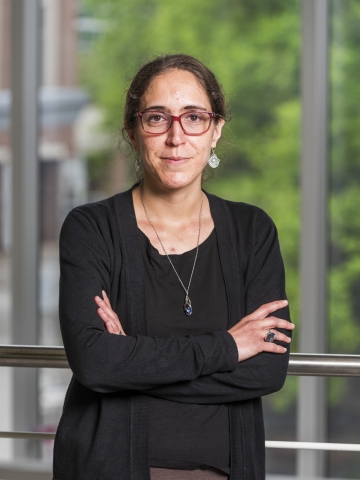Lynn Kamerlin
Contact Information
- shina.kamerlin@chemistry.gatech.edu
- Phone
- (404) 385-6682
- Location
- MoSE 2120A
- Research Group
- Kamerlin Laboratory
- Publication Links
-
Google Scholar
- OrcID

Lynn Kamerlin
Professor and Georgia Research Alliance Vasser Woolley Chair in Molecular Design
Awards
- Georgia Research Alliance Eminent Scholar, 2022-Present
- Executive Council Member, Protein Society 2021-2024
- Wallenberg Scholar 2020-2024
- Lily and Sven Thureus Prize from the Royal Society of Sciences in Uppsala 2020
- Wallenberg Academy Fellowship Prolongation 2019-2024
- The Svedberg Prize from SFBBM 2018
- Fellow of the Royal Society of Chemistry (FRSC) 2017
- Wallenberg Academy Fellowship 2014-2019
- MGMS Silver Jubilee Prize 2013
- Member, Young Academy of Europe (Chair 2014-2015)
- ERC Starting Independent Researcher 2012-2017
- Docent in Molecular Biotechnology, Uppsala University 2012
- Sven and Ebba-Christina Hagberg Prize in Biochemistry from the Swedish Royal Academy of Sciences 2011
- 4 year assistant professorship fellowship funded by the Swedish Research Council (VR) 2011-2015
- UK Royal Society of Chemistry Chartered Chemist (CChem) 2009
Education
- MNatSc (Chem), University of Birmingham (UK)
- PhD (Chemistry), University of Birmingham (UK)
Research
Research in our group sits at the interface between chemistry and biology, with a focus on using computational tools to understand the chemical basis for complex biomolecular problems. In particular, we want to understand the dynamical and mechanistic parameters that shape the evolution of new enzyme functions, and to then harness these to engineer new enzymes with tailored physiochemical properties. To achieve this, we combine methodology development with applications to real world systems, in close collaboration with experimental groups across the world. Examples of recent and ongoing methodology development include replica exchange empirical valence bond simulations to describe chemical reactivity, and machine learning tools to design new enzymes.
More recently, we are working on natural language models to predict protein structure and activity. We combine these tools with a range of enhanced sampling approaches, structural bioinformatics tools and EVB and QM/MM tools to describe conformational dynamics and chemical reactivity, with applications to biomedically important enzymes such as protein tyrosine phosphatases, or quorum-quenching lactonases that can be used to disrupt bacterial communication. We are also particularly interested in the modular evolution of new protein scaffolds with catalytic function, as well as the incorporation of non-canonical amino acids into industrially relevant enzymes for design purposes.
Finally, enzymes are chemical catalysts, and to understand their biological function it is important to understand the intrinsic chemistry they catalyze. We have a long-standing interest, in particular, in understanding the underlying factors driving mechanistic selectivity in both biological and non-enzymatic phosphoryl (and related) group transfer reactions, as well as other fundamental problems in physical organic chemistry.